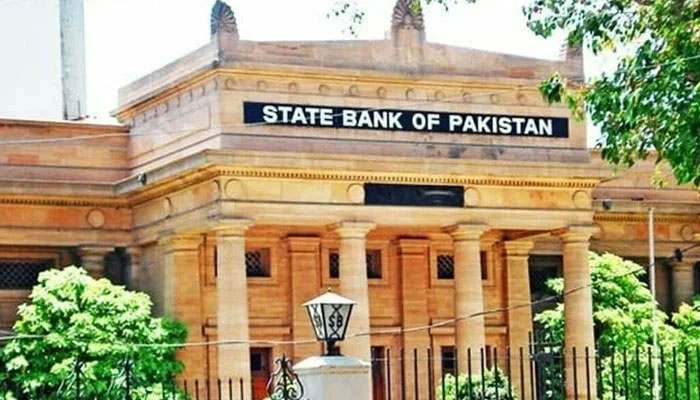Bank deposits jump 21pc y/y on remittances, rate incentives
KARACHI: Pakistanis are saving more money in banks as remittances from overseas workers soar and interest rates remain at a record high.
Deposits at banks increased to Rs27.5 trillion in January, up 21 percent from a year earlier, according to the State Bank of Pakistan data on Monday. Bank deposits, however, fell by 1.1 percent month-on-month in January. The deposits stood at Rs27.841 trillion in the previous month.
The growth in deposits was driven by a combination of factors, including the higher rate of return offered by banks in the wake of a tight monetary policy, the expansion of banks' branch networks, and the improvement in remittance inflows from the Pakistani diaspora, brokerage Optimus Capital Management said.
The central bank has increased its benchmark interest rate by a total of 15 percentage points to a record 22 percent since September 2021 amid skyrocketing inflation. The policy rate has stayed at 22 percent since June 2023. The rate is the highest among major emerging markets.
The currency-to-deposit ratio has been on a declining trajectory due to the strong growth in bank deposits and a decline in currency in circulation. Remittances from expatriate workers rose by 26.2 percent year-on-year to $2.4 billion in January.
The data showed that banks' investments rose from Rs19.293 trillion in January of last year to Rs25.603 trillion in January 2024, a 32.7 percent increase. These investments saw a month-on-month increase of 1.3 percent as well.
However, banks’ advances grew only by 3.7 percent to Rs12.095 trillion. The advances saw a monthly decline of 2.1 percent. As businesses and consumers were hesitant to take out new loans, bank credit to the private sector declined.
High public-sector borrowing restricts the amount of bank funding that the private sector can access. Pakistani banks are unable to utilise their massive liquidity since they have the opportunity to invest in risk-free government securities. Banks blame a drop in lending on borrowers' poor appetite driven by faltering economic activity and higher interest rates.
Banks’ investment-to-deposit ratio surged to 93 percent in January from 85 percent in the same month last year, while the advance-to-deposit ratio fell to 44 percent from 51 percent a year earlier.
The International Monetary Fund said in its country report, which was released last month, that banks' sovereign exposure increased from 48 percent of assets at the end of FY21 to 55.3 percent at the end of September 2023, with private sector credit decreasing.
-
 China Confirms Visa-free Travel For UK, Canada Nationals
China Confirms Visa-free Travel For UK, Canada Nationals -
 Inside Sarah Ferguson, Andrew Windsor's Emotional Collapse After Epstein Fallout
Inside Sarah Ferguson, Andrew Windsor's Emotional Collapse After Epstein Fallout -
 Bad Bunny's Star Power Explodes Tourism Searches For His Hometown
Bad Bunny's Star Power Explodes Tourism Searches For His Hometown -
 Jennifer Aniston Gives Peek Into Love Life With Cryptic Snap Of Jim Curtis
Jennifer Aniston Gives Peek Into Love Life With Cryptic Snap Of Jim Curtis -
 Prince Harry Turns Diana Into Content: ‘It Would Have Appalled Her To Be Repackaged For Profit’
Prince Harry Turns Diana Into Content: ‘It Would Have Appalled Her To Be Repackaged For Profit’ -
 Prince William's Love For His Three Children Revealed During Family Crisis
Prince William's Love For His Three Children Revealed During Family Crisis -
 Murder Suspect Kills Himself After Woman Found Dead In Missouri
Murder Suspect Kills Himself After Woman Found Dead In Missouri -
 Sarah Ferguson's Plea To Jeffrey Epstein Exposed In New Files
Sarah Ferguson's Plea To Jeffrey Epstein Exposed In New Files -
 Prince William Prepares For War Against Prince Harry: Nothing Is Off The Table Not Legal Ways Or His Influence
Prince William Prepares For War Against Prince Harry: Nothing Is Off The Table Not Legal Ways Or His Influence -
 'How To Get Away With Murder' Star Karla Souza Is Still Friends With THIS Costar
'How To Get Away With Murder' Star Karla Souza Is Still Friends With THIS Costar -
 Pal Reveals Prince William’s ‘disorienting’ Turmoil Over Kate’s Cancer: ‘You Saw In His Eyes & The Way He Held Himself’
Pal Reveals Prince William’s ‘disorienting’ Turmoil Over Kate’s Cancer: ‘You Saw In His Eyes & The Way He Held Himself’ -
 Poll Reveals Majority Of Americans' Views On Bad Bunny
Poll Reveals Majority Of Americans' Views On Bad Bunny -
 Wiz Khalifa Thanks Aimee Aguilar For 'supporting Though Worst' After Dad's Death
Wiz Khalifa Thanks Aimee Aguilar For 'supporting Though Worst' After Dad's Death -
 Man Convicted After DNA Links Him To 20-year-old Rape Case
Man Convicted After DNA Links Him To 20-year-old Rape Case -
 Royal Expert Shares Update In Kate Middleton's Relationship With Princess Eugenie, Beatrice
Royal Expert Shares Update In Kate Middleton's Relationship With Princess Eugenie, Beatrice -
 Andrew Mountbatten-Windsor’s Leaves King Charles With No Choice: ‘Its’ Not Business As Usual’
Andrew Mountbatten-Windsor’s Leaves King Charles With No Choice: ‘Its’ Not Business As Usual’




